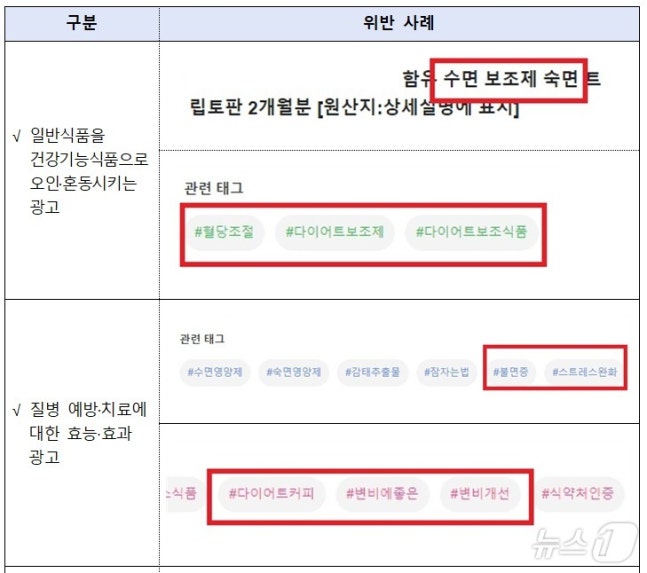
Phát hiện 56 trường hợp quảng cáo sai về thực phẩm như thuốc giúp ngủ ngon
Nhiều thực phẩm chức năng có quảng cáo không công bằng và lừa dối người tiêu dùng..
Vì vậy, tôi luôn có thói quen kiểm tra xem sản phẩm có được chứng nhận an toàn thực phẩm chức năng của Bộ Y tế hay không.
Thành thật mà nói, khi có deal hot thì rẻ quá... tôi cũng đã mua rất nhiều...
Nếu xem xét thì có các loại kẹo, các loại thực phẩm chế biến thông thường. Ừ... cũng có nhiều trường hợp như vậy...
Vui lòng kiểm tra dấu chứng nhận của Bộ Y tế và Phúc lợi để tránh nhầm lẫn với thực phẩm chức năng có lợi cho sức khỏe.
Và các loại thực phẩm vi phạm như vậy có thể được tìm thấy trên trang web "An toàn Thuốc Quốc gia" của Cục Quản lý Thực phẩm và Dược phẩm.
----------------------------------

(Seoul=News1) Kang Seung-ji phóng viên = Cục An toàn Thực phẩm và Dược phẩm đã phát hiện 56 trường hợp vi phạm Luật về ghi nhãn và quảng cáo thực phẩm, bao gồm việc quảng cáo sai về thực phẩm thông thường như "thuốc gây ngủ", "thuốc giúp ngủ ngon" trên các trang mua sắm trực tuyến và các nền tảng khác, ngày 6 tháng 4.
Trong bối cảnh nhiệt đới kéo dài vào mùa hè làm tăng sự quan tâm của người tiêu dùng đối với sức khỏe giấc ngủ, cuộc kiểm tra lần này nhằm phát hiện các trường hợp thực phẩm quảng cáo sai sự thật về tác dụng có lợi đối với giấc ngủ, đồng thời nhằm phòng ngừa thiệt hại cho người tiêu dùng.
Chúng tôi cũng đã kiểm tra các hành vi buôn bán trái phép các thực phẩm nhập khẩu từ nước ngoài, chứa các thành phần như 'sennoides' không được phép sử dụng làm nguyên liệu thực phẩm, cùng với các quảng cáo trực tuyến liên quan đến các sản phẩm 'giảm cân' và 'quản lý hình thể' đang ngày càng thu hút sự chú ý trong mùa hè.
SennoSide sử dụng lá sen làm thành phần thuốc để điều trị táo bón. Sử dụng quá mức hoặc lạm dụng có thể gây ra tác dụng phụ như tiêu chảy, nôn mửa, suy giảm chức năng ruột. Đây cũng là một loại nguyên liệu hoặc thành phần bị cấm nhập khẩu vào trong nước như một thực phẩm.
Kết quả kiểm tra cho thấy có 28 trường hợp (50%) quảng cáo thực phẩm thông thường như "sức khỏe giấc ngủ", "thực phẩm bổ sung giấc ngủ", "giảm cân" gây hiểu lầm là thực phẩm chức năng. Ngoài ra, còn có 20 trường hợp (35,7%) quảng cáo thực phẩm nhập khẩu từ nước ngoài chứa thành phần sennoid.
Ngoài ra, còn có 5 trường hợp (8,9%) quảng cáo gây hiểu lầm hoặc nhầm lẫn về việc thực phẩm thông thường có tác dụng phòng ngừa hoặc điều trị bệnh, quảng cáo làm người tiêu dùng hiểu nhầm là thuốc như "thuốc giúp ngủ ngon", cùng với các quảng cáo lừa dối người tiêu dùng qua đánh giá sau khi mua hàng hoặc trải nghiệm, và các quảng cáo về thực phẩm chức năng có nội dung khác với nội dung đã được kiểm duyệt.
Vì đã phát hiện nhiều quảng cáo sai lệch khiến người tiêu dùng nhầm lẫn thực phẩm thông thường là thực phẩm chức năng, Cục Quản lý Thực phẩm và Dược phẩm đã khuyến cáo người tiêu dùng kiểm tra 'Dấu chứng nhận thực phẩm chức năng' trên sản phẩm khi mua hàng trực tuyến.